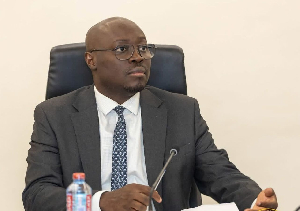A Case for Social Entrepreneurialism
Richmond Quarshie
Social entrepreneurialism is not a new concept to Ghanaians. Indeed, put aside the pedantic terminology, it is fundamental to how Africa has functioned as a society from day one. However, with Ghana now in the league of oil producers, the case for social entrepreneurialism could not be timelier. Understood in the context of the problems that have beset Africa’s resources in the past, the country has landed itself the opportunity to exact a change that could alter the course of its affairs for the better. If Ghana rises to the challenge, it would be one of the few states where future generations can look back on this moment as being a turning point in terms of securing the foundation for their prosperity.
In terms of the solution that social entrepreneurialism infers, Ghana does not have to dig that far to pull off this great feat. Nevertheless, it is important to step back for a moment and familiarise ourselves with what exactly is meant by the term. Social entrepreneurialism, contextually speaking, refers to the committed efforts of social entrepreneurs. In a sense, that label can easily be applied to the benevolence of many Ghanaians whose spheres of provision and influence exceed immediate families and selfish gains. Social entrepreneurs, typically, rely on entrepreneurial instincts or principles to effect solutions to social problems and in doing so create social capital or value as to profits and returns.
A legacy that ‘developing countries’ continue to suffer from, even where resources are in abundance is the impact null when it comes to the lives of the masses. Straightaway, the priority for Ghana should be how to break this curse in the context of obvious social, environmental and economic challenges. Indeed, the country is staring at a window of opportunity to define a new era with its ‘black gold’ that would ensure that the mistakes of the past are not repeated. Globally, the talk of change seems to have stalled but Ghana can stake its claim as being where the walk is at in terms of a new beginning.
Social entrepreneurialism, indeed, could be the new wind of change for the country, just as it was with the independence movement, signalling a golden age of hope not only for Africa but anywhere where oil has typified nothing more than turmoil and misery. Obviously, it calls for intense debate at all levels especially in the communities to be most affected. However, with the right approach, a credible path can be cemented where there is a proper stake for them and all Ghanaians. Ghana, irrespective of its political alignment, must now realise that the days of resources squandering with disregard for the populace are unsustainable with political leaders under more scrutiny to provide answers. Social entrepreneurialism in the form that the country must embrace represents something completely different to patronising notions of rural development that Africa has seen in the past, with nothing concrete for the long term.
The excitement around the form of entrepreneurialism advocated here, contextually, is the way in which it encourages ventures to be created, organised and developed with social change as the main goal. As an approach, there is a marked difference between this and the aggressive capitalism that the continent is all too familiar with, including some of Ghana’s neighbours. In some countries, this has spilled over into social and political injustices leaving the extra headache of bitter conflicts, distrust and widespread corruption. Given what is at stake, the phenomenon of militia groups parading themselves as defenders of their resources rightly or wrongly must be seen as all the reason to ensure that Ghana’s oil wealth does not strut a similar note.
Having said that, much of what is passed off as social entrepreneurialism only holds stead by name, barely scratching the surface of the change that it portents. However, if the underlying code of engagement and participation is unravelled, evidence of which is not hard to find, the social impact can be phenomenal. This challenge is not beyond Ghana, technologically, politically or any platform available as a forum to move things forward. In being touted as the ‘Gateway to Africa’, the country should be where new chapters are turned particularly in heralding a respect of the earth’s resources so that these are extracted on the basis of need and human advancement with future generations in mind.
With ownership, understanding and proper deliberation, the particular model of social entrepreneurism being suggested for Ghana’s oil wealth will pave way for innovations with giant strides both in nation building and on the continent as a whole. Even more so, the social change as a result will evolve a dynamic for wealth creation in a model that portends civility, stability and real progress. Even if Ghana faces criticism in its stance, common sense alone will applaud the good in an option that subverts greed, environmental damage and conflicts.
Social entrepreneurialism should be a hot topic on everyone’s lips as news of more oil finds graces the headlines. With this Ghanaians must look to an approach that exudes openness, accountability and transparency with credible systems including legislation that factor in future generations as beneficiaries of the nation’s ‘black gold’, which cannot be just left to sitting governments. Importantly, this process begins with information that is clear about how much barrels is coming out of the earth, where it goes, who takes what and most of all what is left in Ghana’s coffers. This needs to be communicated in the plainest language to engage a healthy debate on the best use of the proceeds. A model of development is required whereby the oil wealth is understood, owned and respected for the purposes of national interests, which in variably underlines a regional strategy for the social entrepreneurialism drive that emerges as a result.
In the first place and most definitely before anything solid can happen the Ghanaian Government with a mandate from the populace must look to establish a body with legs in every region to co-ordinate the programme in mind. Moreover, the companies involved must also, if they have not done so already, be thinking about the establishment of Foundations and Trusts as evidence of their social responsibilities and an engine to promote social causes that will reap benefits in terms of Ghana’s developmental goals. On the whole, the country must push through a programme to educate the populace about the tenets of social entrepreneurialism and the potential for shaping its future affairs. Even more so, decision-makers must understand the implied value chain so that Ghana’s oil is not looked at in isolation but as a strategic to bridge the development gap as a basis of real growth with a keen eye on a just and prosperous society in which all Ghanaians have a stake.
Even if Ghana, for now, has to go along with the growing demand for oil, it does not stop a consideration of much wider implications that new approaches are desperately needed. As such, the debate being pushed here is even more important in that, it turns the table towards one to alter the course of history and doing so allow the country to live up to its name which is endowed in leadership and a beacon for freedom and social and political justice.
The writer is an educationalist, development strategist and consultant particularly known for his work in the areas of community development. Richmond, an advocator of racial justice, has operated at all levels. He is an accomplished and published writer, and has had articles published in the Voice, Pride Magazine and The Northern Journal notwithstanding his contribution in the book Black Families in Britain as the Site of Struggle, published by the Manchester University Press. In June 2005 Richmond, assisted by a group of friends won a landmark ‘race’ discrimination case against Serco. He sports post-graduate qualifications in management and teaching including an MBA from the Bradford School of Management and also enjoys a successful career in the music business.
Opinions of Thursday, 2 June 2011
Columnist: Quarshie, Richmond














